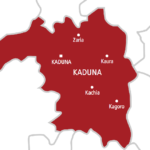Born on the fringes of Indian society, she has fought her way up through hard work and guts.
A volunteer with the Deccan Development Society (DDS), she now tries to help other poor women, most of whom are Dalits, the lowest group in the Indian social hierarchy.
But while food distribution is a vital part of what she does, Manjula is more excited about her role as a radio journalist. And it is in this job that she thinks she can really make a difference.
The local radio station has a state-of-the-art studio in a very ordinary looking house in Pastapur, 100 kilometres (60 miles) from Hyderabad.
‘Many benefited’
Its daily two-hour broadcasts are peppered with small titbits on farming, medicine, health and music.
“It’s a great way for us to document all the local knowledge that otherwise would have just remained within families,” she explains.
“Many people have benefited because of this and everyday I am learning something new as well.”
In fact the community radio concept has caught on so well that many women from the village have become regular contributors.
H Lakshmamma is one such example. Along with her job in farming, every month she makes nearly ten hours of programming for the community radio.
She says that she gets paid about $10 (£6.30) a month for the radio work she does, and it is extra money that she uses to buy food for her family.
Lakshmamma was abandoned by her husband many years ago. Not only has she managed to raise her daughter all by herself, but she has also become a key member of the DDS.
It is a tough life for these women in the village. Most of them have not been to a formal school and work in the nearby fields.
Until the radio station came along, they knew very little about new technology in farming, or better selling practises.
Most of their information was gleaned from chatting to neighbours or swapping stories while they worked.
Microphone not spade
But technology now means that the women in Pastapur and surrounding areas can get their tips, information and news from the radio, spreading their message of empowerment and more efficient working wider, and with more impact in the local community.
And it is not just the younger women who have benefited from the radio. Senior citizens are also learning to incorporate it into their daily lives.
As well as listening to the radio shows, some of the older women have even recorded songs for broadcast. These women have struggled all their lives and it is a big deal for them to hear their own voices on the radio.
The station’s entire two-hour daily broadcast is put together by two women, and 25-year-old Algole Narsamma is one of them.
She comes from a family of farmers and for her the programme is a ticket to another world. “If I hadn’t become a radio producer I would be in the fields like others in my family,” she explains. “And instead of the microphone there would have been a spade in my hands.”
For many women the radio station has had a profound effect on their lives, and the hope for DDS is that it can continue the project and expand it to other regions and villages.
At the moment it is funded by money from development organisations, though the station hopes to make a profit selling advertising in a couple of years.
More than entertainment
P V Satheesh is one of the founders of DDS and says that the radio station has helped women in the region become more confident.
He explains that the idea was to get local voices to talk to the local people on issues that were close to their hearts.
And while the start of the station may have been a success, he admits that there are many challenges ahead.
Not least the problems of finding enough cash to keep going, and keeping up with fast-moving changes in technology.
In the meantime, the plan is to focus on the local community, where slowly but surely, listening to the radio is catching on.
And while for many of the audience it is a bit of entertainment, for the women involved it is a lot more than that.
It is a means of asserting themselves in this rural setting, of finding a voice and putting themselves in greater control of their own destiny.
Source: BBC online



